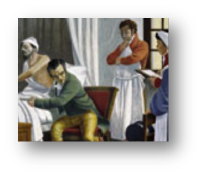Blindness, Sound and the Development of Acoustics in Nineteenth-Century France
This project provides the first account of the historical relationship between blindness and medical acoustics. Studies on the blind have focussed primarily on the contribution of the blind to touch-sensation technologies such as the reading and writing tools developed by Louis Braille. There was, however, an exploratory agenda of medical acoustics surrounding the ‘sound-sensitive’ blind in nineteenth-century France. This agenda, founded on the theory that acoustical impulses of the body can be graphically ‘mapped’ and ‘ordered’, was central to major medical discoveries of the period such as those made by René Laënnec in the field of auscultation. By investigating medical acoustical history through the activities and experiences of the blind, Dr Sykes ascertains the extent to which the disabled themselves contributed to medical ‘discoveries’ (constructions) and to their social implementation.
The study highlights the extent to which established medical theorists relied on acoustical wave theory to explain and diagnose a whole range of human medical conditions, and the impact of this theory on contemporary practices of music therapy. Institutions for the blind were sonic environments which translated medical-acoustical theories into everyday situations. Critical analysis of music curricula within these institutions reveals key insights into how music therapy became embedded in institutional practice for the blind. The most substantial part of the study examines hitherto unknown individual case-studies of blind residents in nineteenth-century Parisian institutions. These case-studies throw light on the attitudes, feelings and responses of the blind person in relation to medical-acoustical theory, and to its implementation. Both rejection and appropriation of medical-acoustical theories could have serious implications for the blind person. If, on the one hand, the blind rejected such theories they were blatantly ignoring medical advice, and openly endangering themselves to the societal divide of ‘illness’. But if, on the other hand, they appropriated them they risked becoming ‘used’ as tools for medical testing and progress. A major aspect of the study aims to address the ways in which the blind negotiated this dilemma through public musical performances, teaching and networking. To what extent were they able to articulate their own sonic ‘voice’?
 |
Event Signalling Sound, International Symposium, 7 March 2009 - Details |
 |
Publications Sound & Vision - Blind people were poorly treated in 19th-century France, but were key to the development of new medical technologies. 2005 |
| |
Conferences / Seminar Papers |



